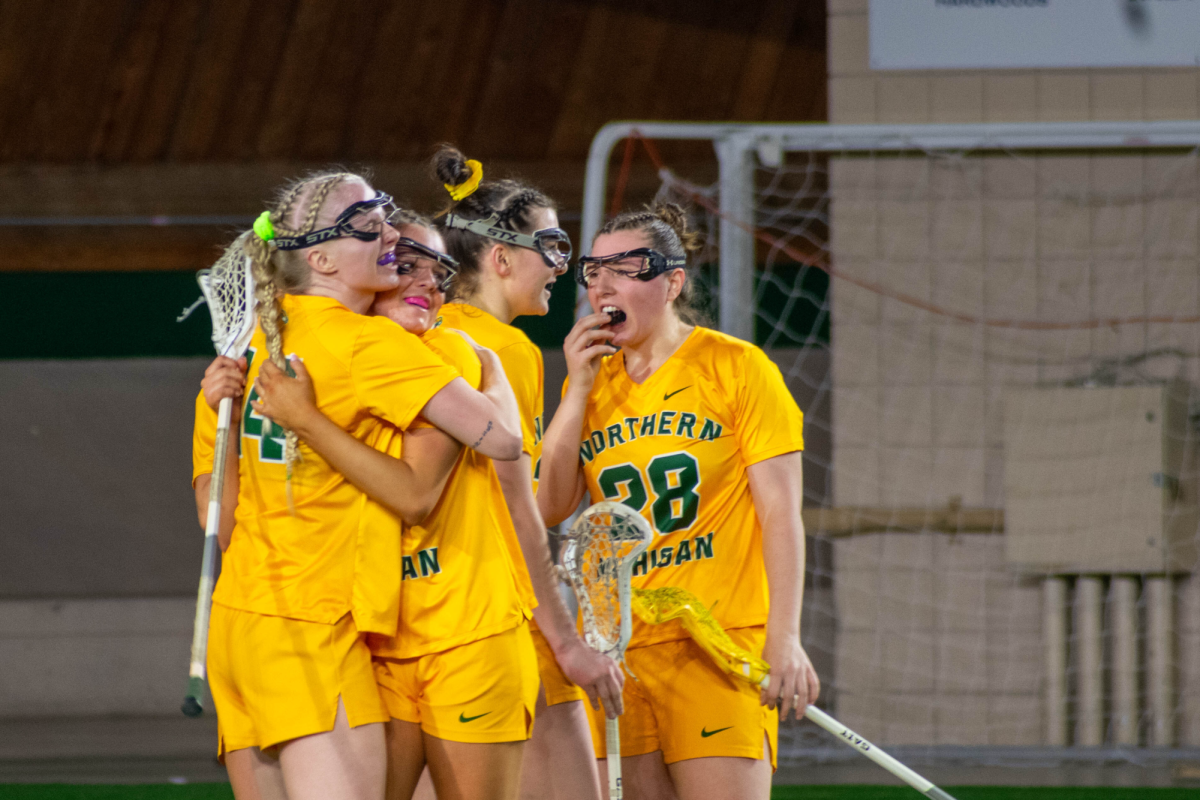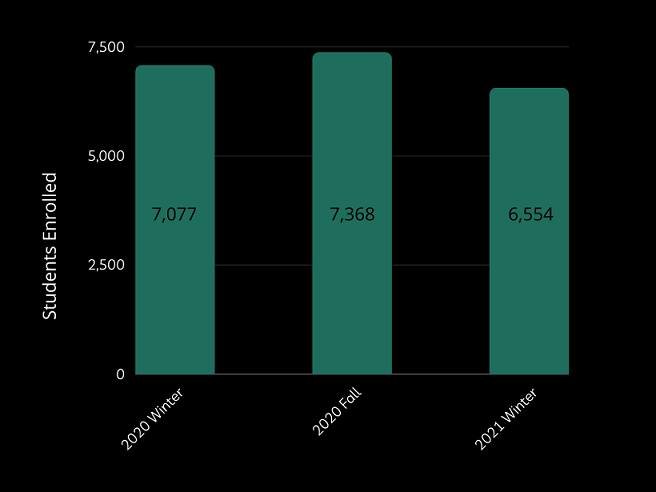Recently, NMU released its 10-day enrollment numbers and the numbers show a pretty significant drop in attendance from the fall 2020 semester. During the previous semester, there were a total of 7,368 students enrolled at NMU and now that number has dropped to 6,554. While these sorts of dips in enrollment from the fall to winter semester are normally the case, this semester there has been a decrease in enrollment by nearly 500 students from the winter 2020 semester, according to NMU’s enrollment factbook. The factors related to the pandemic such as an increase in financial burden appear to be linked to a decrease in enrollment nationwide.
The dip in enrollment mirrors the fall semester and has hurt undergraduate students especially. According to a study done by the National Student Clearinghouse Research Center, the U.S. has seen a decrease of 4.5% in enrollment for undergraduates compared to last spring. So far in Michigan, there has been a 6.3% drop in enrollment compared to last spring. Of those undergraduates, the study says students of color have seen larger decreases as a whole.
The group nationally that saw the biggest drop in enrollment is undergraduate international students who saw a 15.6% decrease. They were followed by undergraduate Native American students who saw a decrease of 12.5%, according to the study.
“Undergraduate enrollment declined in all racial and ethnic categories. While Native American enrollment decreased the most, Asian and Latinx enrollments dropped this spring in contrast to their growth last spring,” the study says.
Based upon the enrollment numbers for NMU specifically, President Fritz Erickson said that the decrease in enrollment was both “expected and a surprise”. For the Fall 2020 semester, the enrollment decrease was at 4.2% while in Winter of 2021, the decrease was greater at 7.2%.
“What’s happened is that we watched enrollment trends throughout Michigan, throughout the country, and so forth. We saw similar trends at other institutions and we can compare us to other institutions who are following some of those trends,” Erickson said. “So in some ways, [the decrease] is not a surprise, but in other ways is because we’ve done so well, with enrollment, we really felt that we were going to be able to maintain our numbers a little bit closer to what we think they should have.”
In regards to students of color and those coming from lower-income households, NMU saw a decrease with students in these demographics. In the fall semester, NMU had 1,137 students of color versus in the winter semester only 993 which is a 144 person decrease in total. Erickson said that this decrease is a concern for NMU and that the reason for not attending varied for each individual. NMU’s enrollment didn’t follow the national average and saw fewer decreases in attendance for Native American and international students. Native American students at NMU dropped from 104 students to 96 seeing a smaller decrease than the national average. International students at NMU also saw smaller dips than the national average with 35 students enrolled in the Language, Literature and international studies program compared to the 39 enrolled in the Fall 2020 semester.
Instead, NMU students of color that experienced the largest decrease were Hispanic or Latinx students who had 269 students enrolled for the Winter 2021 semester compared to 312 in the semester prior. They also make up the majority of students of color representing 27.1% of students. The next group that saw similar dips were students who listed their ethnic background as unknown. The group had 163 students in the Fall 2020 semester and has since seen a drop of 38 students in the current semester.
“What [the decrease] has done is really help us launch into a strong, comprehensive review of all of our work in the area of equity and inclusion and diversity. In fact, I will be announcing here shortly, the real task for us, as you know, Jessica Cruz has left and Jessica did a marvelous job for us. I mean, I just think the world of her,” Erickson said. “However, whenever you have a major change like that, it’s time to take a step back and say, okay, what’s the future going to bring? I’m really excited about some of the initial planning that we’re looking at, to continue the path forward for this university. To be welcoming, supportive, engaging with students across the full spectrum.”
Ashley Martinez, senior history major, feels that NMU has not done its equity part in helping students who are of color or lower-income backgrounds. Martinez said that having the Office of Equity and Inclusion should mean that students in this demographic should have been better supported so that they could stay in school through the pandemic. She said diversity isn’t just people of color but includes LGBT, low-income white people and women from all backgrounds.
“I think that a lot of the time, Northern only focuses on who’s going to keep the lights on and I just think it’s very ironic that we have that office yet, we did not attempt to help these students stay here,” Martinez said.
Martinez feels that the extra pressure put on some low-income and minority students from the pandemic prevented students from returning this semester to NMU. Martinez said that for example some students of color couldn’t return because they have had a family member get sick or die and because of that had to leave school and get a job to provide for their family.
“Being a student is a full-time job and when your family is affected by the pandemic for example losing an income, you feel like you have to do your part. Studying isn’t going to do that,” Martinez said.
Alyssa Wilkinson, junior forensic anthropology major, is part of the demographic of lower-income students and feels that NMU has been more concerned with keeping the students enrolled versus their personal well-being.
“I don’t feel comfortable talking with financial aid because it doesn’t feel like a safe space for me to discuss information with,” Wilkinson said. “I don’t have a sense of comfort for being able to talk and be honest about my financial situation.”
Wilkinson felt that if NMU checked in with students who come from lower-income families to see how they were doing financially, this would build a better relationship between students and staff.
“If staff were able to understand better what the student’s situation was, I think it would give everyone a better understanding of how to help the students,” Wilkinson said.
Part of NMU’s initial response with COVID-19 relief funds for students was the Wildcat 2020 Student Relief Fund. This allowed students to earn $300 during the Fall 2020 semester to help with utility bill assistance, groceries, phone bills and moving expenses. This fund was not continued into the Winter 2021 semester, but Erickson said that NMU is working on something similar.
“We thought it was very beneficial to put dollars right in the hands of students because of the additional expenses and so forth of individuals, students with COVID,” Erickson said. “So, as soon as we know what the dollar amounts are, again, we’ll be working on something comparable.”
As for when NMU can expect to see an increase in enrollment, Erickson said that the university expects to see an increase in the upcoming fall semester, however, the bigger challenge is finding out what returning students will be coming back.
“We expect pretty large numbers with that, but it’s really hard to be able to pinpoint that,” Erickson said.
To increase enrollment for the upcoming school year, NMU has launched new scholarship programs, increased recruiting efforts in the admission’s office, and working towards having people visit campus once again.
“We’re continuing to work through that and developing processes of engagement. I’m looking forward to getting back to the days when we could do Wildcat Weekends,” Erickson said. “Those will be our plans to have those up and crank and going in the fall like we always do, so we’ll get back to doing the things we did pre-COVID.”
Before COVID-19, NMU was one out of two universities in Michigan that had an increase in enrollment. Erickson said that NMU is confident that they’ll be able to bring that number back up. Going into the Fall 2021 semester, the plan is for NMU to be fully face to face again, which could help with the increase in enrollment. Erickson said that the summer between Winter 2021 and Fall 2021 is going to be a “transition” period for the university.
NMU will still be doing big in-person orientations, however, the school plans on finding other ways to re-engage people while still following COVID-19 safety protocols.
“I’m very encouraged by, you know, what’s happening in terms of numbers of cases that we’ve had, you know, the prevalence, the rate in the U.P. and the number of folks are getting vaccines, all of those things are very positive signs,” Erickson said. “But I do think we’ll be phasing out a whole series of opportunities for people to come in and experience Northern as part of this whole plan to get people reengaged. So we’re talking right now through the ability to do summer camps again and try and find different ways of using our facilities in the summer.”
As far as budget allocations go, Erickson said that NMU has still been able to maintain budgets with this drop in enrollment and that NMU as a whole has continued to remain in a “strong financial position” and be able to maintain the second-lowest tuition in the state.
“We’ve been able to manage [budget] without cuts. One thing I would point out is through the course of COVID, we may be the only institution that I’m aware of that didn’t go through massive layoffs or position elimination,” Erickson said. “We didn’t do that. We went and did this whole thing with two goals, keep everyone employed and to keep everyone on their health insurance and I have to say, I’m really proud of the university for finding the path forward for being able to do that.”

























